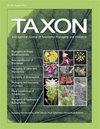小豆蔻难题迎刃而解:重新圈定并将白豆蔻归入唯一泛热带分布的姜系
IF 2
2区 生物学
Q2 EVOLUTIONARY BIOLOGY
引用次数: 0
摘要
本研究的总体目标是梳理一组姜科植物的分类学,其中包括有用的、在全球具有重要经济价值的绿豆蔻(Elettaria cardamomum)及其野生近缘植物,以突出可能被忽视的遗传资源。这些物种天然存在于印度和斯里兰卡,我们的研究有助于对其所在的剩余森林片段进行更适当的优先管理。我们使用了 NGS Hyb-Seq 方法,对 Alpinia I(传真)支系的四个物种、Aframomum 和 Renealmia 的六个代表物种以及其他两个基部开花的斯里兰卡物种进行了采样。我们的研究结果表明,Alpinia I 支系实际上只是 Elettaria 属(仅限于印度和斯里兰卡),它是 Aframomum 属(非洲)和 Renealmia 属(非洲和新热带地区)的姊妹属。其分类学意义如下(1) 重新划分了 Elettaria 属,包括 7 个种(E. cardamomum、E. ensal、E. floribunda、E. involucrata、E. rufescens 以及两个新种:E. facifera 和 E. tulipifera)。tulipifera);(2)斯里兰卡特有属 Cyphostigma 应予保留;(3)描述了斯里兰卡特有的新单型属 Srilankanthus,以 S. nemoralis(原 Amomum nemorale)为模式。提供了 Elettaria 的 7 个种的检索表,并对 5 个种(Cyphostigma pulchellum、Elettaria floribunda、E. involucrata、E. nemoralis、E. rufescens)进行了模式鉴定。本文章由计算机程序翻译,如有差异,请以英文原文为准。
The cardamom conundrum resolved: Recircumscription and placement of Elettaria in the only pantropically distributed ginger lineage
The overarching aim of the present study is to sort out the taxonomy of a group of gingers that include the useful and worldwide economically important green cardamom, Elettaria cardamomum , and its wild relatives, to highlight potentially overlooked genetic resources. These species occur naturally in India and Sri Lanka, and our study facilitates more appropriate management priorities for the remaining forest fragments in which they occur. We used NGS Hyb‐Seq methods and sampled four species of the Alpinia I (Fax) clade, six representatives of Aframomum and Renealmia as well as two other basally flowering Sri Lankan species. This is the only pantropically distributed lineage within the entire family, and our result shows that the Alpinia I clade in fact is simply the genus Elettaria (confined to India and Sri Lanka), which is sister to the genera Aframomum (Africa) and Renealmia (Africa and Neotropics). The taxonomic implications are: (1) a recircumscription of Elettaria comprising seven species (E. cardamomum , E. ensal , E. floribunda , E. involucrata , E. rufescens as well as two new species, E. facifera and E. tulipifera described here); (2) the Sri Lankan endemic genus Cyphostigma should be retained; (3) the new monotypic genus, Srilankanthus endemic in Sri Lanka, is described with S. nemoralis , formerly Amomum nemorale , as type. A key is provided to the seven species of Elettaria and lectotypifications are made for five species (Cyphostigma pulchellum , Elettaria floribunda , E. involucrata , E. nemoralis , E. rufescens ).
求助全文
通过发布文献求助,成功后即可免费获取论文全文。
去求助
来源期刊

Taxon
生物-进化生物学
CiteScore
4.70
自引率
8.80%
发文量
177
审稿时长
6-12 weeks
期刊介绍:
TAXON is the bi-monthly journal of the International Association for Plant Taxonomy and is devoted to systematic and evolutionary biology with emphasis on plants and fungi. It is published bimonthly by the International Bureau for Plant Taxonomy and Nomenclature, c/o Institute of Botany, Slovak Academy of Sciences, Dúbravská cesta 9, SK-845 23 Bratislava, SLOVAKIA. Details of page charges are given in the Guidelines for authors. Papers will be reviewed by at least two specialists.
 求助内容:
求助内容: 应助结果提醒方式:
应助结果提醒方式:


